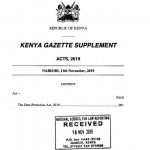Regulation of the Digital Space in 2019 and prospects for 2020
2019 has been a busy year in relation to initiatives and discussions on regulation of the digital space in Kenya. While certain positive gains have been achieved, Kenya still staggers towards limitation of digital rights in certain aspects. Below is a summary of some of the regulatory initiatives in the digital space that shaped 2019 and are most likely to have an impact in 2020 –
Data Protection Act
The Data Protection Act was finally signed into law after almost a decade of discussions on data governance and protection in Kenya. Short term issues on implementation of the Act include –
Appointment of the Data Protection Commissioner; Formulation of regulations on thresholds for registration of data controllers and data processors; Institutions undertaking data protection impact assessments; and Institutions appointing data protection officers.
I have previously written on what businesses need to do to comply with the Act. The article may be accessed here – The Data Protection Act, 2019 – What Next for Businesses?
Kenya Information and Communication Act Amendment Bill, 2019
The Bill seeks to amend the Kenya Information and Communication Act. The Bill seeks radical regulation of users of social media platforms by requiring stringent licensing and policing. The Bill also seeks to regulate the sharing of information, it creates obligations to social media users, registration of bloggers and seeks to give responsibility to the Communications Authority to develop a bloggers code of conduct for bloggers.
The Bill is an indication of Kenya’s move towards limiting the right to freedom of expression, freedom of the press and access to information. I published and analysis of the Bill here – The Farce that is the ‘Bloggers Bill’.
Constitutional Petition on the Computer Misuse and Cybercrimes Act
26 sections of the Act remain suspended (sections 5, 16, 17, 22, 23, 24, 27, 28, 29, 31, 32, 33, 34, 35, 36, 37, 38, 39, 40, 41, 48, 49, 50, 51, 52 and 53). The High Court will make a final determination on the constitutionality of the Act in early 2020.
The decision will have an effect on how moving forward, Kenya will deal with matters like cyber security, cybercrimes in general, revenge pornography, cyber bulling, cyber-squatting and cyber stalking among others.
Huduma number
The government initiated the National Integrated Identity Management System (NIIMS) program through Executive Order No. 1 (2018). The purpose of the initiative according to the government was to create and manage a central master population database which is to be the ‘single source of truth’ on a person’s identity. The database is to contain information of all Kenyan citizens and foreign nationals residing in Kenya and is to serve as a reference point for ease of service delivery to the people of Kenya.
The initiative was challenged and the High Court made temporary orders to the effect that – the government could not withhold services on the basis of lack of the huduma number; no collection of DNA samples and GPS information was allowed; and registration for huduma number was not compulsory.
Petitions challenging the huduma number are still active in the courts. Perhaps, in 2020 the courts will render their verdict on whether the initiative is in line with the Constitution. However, it is important to note that one of the key issues in contention was the lack of a data governance and protection law; with this in place via the Data Protection Act, 2019, a large part of the petition is already moot.
Digital Economy Blueprint and Block chain report
The Digital Economy Blueprint launched by the government this year seeks to provide a conceptual framework adopted by Kenya in its quest towards the realisation of a successful and sustainable digital economy. The Blueprint identifies five pillars of the digital economy – digital government, digital business, infrastructure, innovation-driven entrepreneurship and digital skills and values. To implement this, the report proposes among other initiatives – creating a regulatory framework for more investment and innovation and strengthening privacy and data security (done through the Data Protection Act 2019).
The Block Chain Report launched by the Ministry of ICT was dubbed Emerging Digital Technologies for Kenya: Exploration & Analysis. The report assesses how the emerging technological revolution could be leveraged to enhance Kenya’s impressive track record of ICT adoption and development. The report states –
‘This report describes how these emerging technologies can support all these agenda items, ranging from improving health coverage by employing the Internet of Things (IOT) and Artificial Intelligence (AI) to improving the food sustainability using Blockchain technology to eradicate counterfeit seeds. The report argues that of all the emerging technologies, none exhibits the potential to be as disruptive and transformative as distributed ledgers with a focus on Blockchain and AI technologies. The use of Blockchain and AI technologies could be transformative across several key sectors in Kenya, including healthcare, agriculture, education and government services. The improved efficiency, transparency and accountability of Blockchain can considerably benefit government services in which several emerging markets struggle with inefficient legacy infrastructures and an inability to provide citizens with fast, accountable and transparent service delivery.’
The two reports propose regulation for the above. Perhaps, the regulations will be put in place in 2020 especially in relation to blockchain technology, distributed ledgers, 5G technology and Internet of Things (IOT).
Section 84D of the Kenya Information and Communication Act declared to be unconstitutional
In the case of Cyprian Andama v Director of Public Prosecution & another;Article 19 East Africa (Interested Party) [2019] eKL section 84D of the Kenya Information and Communication Act which outlaws publication of obscene information in electronic form was declared to be unconstitutional.
The Section stated – “Any person who publishes or transmits or causes to be published in electronic form, any material which is lascivious or appeals to the prurient interest and its effect is such as to tend to deprave and corrupt persons who are likely, having regard to all relevant circumstances, to read, see or hear the matter contained or embodied therein, shall on conviction be liable to a fine not exceeding two hundred thousand shillings or imprisonment for a term not exceeding two years, or both.”
In my view the above decision is a two-edged sword, while it protects the right to freedom of expression, it may prove problematic when dealing with cases of revenge porn and cyber bullying. This year I published two articles on these issues – Cyber-Bullying Under Kenyan Law and The Revenge Porn Dilemma .
E-Citizen and E-Government
E-citizen has increased the number of e-government services it offers on its platform. The platform houses national government services for Department of Immigration Services, Business Registration Service, Civil Registration Service, Directorate of Criminal Investigation, National Transport and Safety Authority, Ministry or Lands and Planning, Higher Education Loans Board, Kenya Revenue Authority, National Environment and Management Authority and the National Construction Authority. However, Kenya still lacks any concrete legal regulations on e-government. Recently Parliament rejected regulations on electronic land transactions.
Perhaps, 2020 will be the year we will have legislation on e-government. I have argued before that E-Government Without Concrete Legislation is a Shaky Enterprise.
The NTSA (Operation of Digital Hailing Operators) Regulations, 2019
The government has drafted regulations to govern operation of digital taxi business. While still in raw draft form and undergoing public participation, the regulations will definitely have an impact on how taxi business in conducted through digital platforms.
Taxation of Digital Businesses
The Kenya Revenue Authority has enhanced efforts to collect revenue from individual and businesses deriving revenue from online platforms. This will have an impact on how and what business is conducted online.




